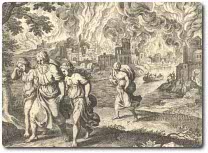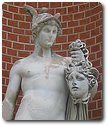The White Devil Contents
- Social / political context of The White Devil
- Religious / philosophical context of The White Devil
- The Theatre
Act 3 scene 2
Synopsis
The trial of Vittoria. All the main characters are on stage. Vittoria insists that her trial is not conducted in Latin and is equally unhappy at the lawyer's complicated language. She is successful at getting him dismissed from the court.
Monticelso then takes charge of the trial, accusing Vittoria of being a prostitute. He gives a long speech describing the characteristics of prostitutes, the implication being that all he has said applies to Vittoria. She vigorously defends herself.
Monticelso continues, claiming that the natural consequence of immorality is adultery, followed by murder. Monticelso and Francisco try to implicate Vittoria in Camillo's death, especially when Brachiano admits that he was in her house the night Camillo died. After Brachiano leaves the court, Francisco suggests they revert to the accusations of adultery. These Vittoria refutes, despite having received goods and money from Brachiano.
Monticelso dismisses Flamineo and Marcello saying there are no charges against them. Vittoria angrily protests at the injustice of being confined in a house of reformed prostitutes along with Zanche, her servant, but is led away.
Francisco is surprised when Brachiano returns briefly to make peace with him, in the face of ‘a friend's' death. Meanwhile, Flamineo decides he will pretend to have gone mad because of his sister's disgrace. The situation becomes clear when Giovanni enters with Lodovico and reports the death of his mother (who is Francisco's sister). Giovanni's grief affects his uncle, Francisco, who vows to keep Isabella's memory alive.
Commentary
All the important characters are on stage, as well as the six ambassadors. This signals the significance of the scene and Vittoria's trial. Even though it is a new scene, the action would probably be unbroken from the previous one.
Lays a rich gown: There is no place set aside for Brachiano. He has to sit on the floor on a gown. He chooses not to take the chair offered by Francisco.
Domine Judex ... corruptissimam: Latin – Lord Judge, turn your eyes upon this plague, the most corrupted of women.
What's he ... charge me: Vittoria challenges the lawyer's use of Latin. Although she understands it herself, there are those who do not and she wants everyone to understand what she is being accused of.
Most literated judges ... her projections: The lawyer's speech is full of over-complicated and often nonsensical language. Diversivolent is the lawyer's own invention meaning ‘wishing strife'. Concatenation means ‘a sequence'. This would have been a source of humour on stage and a way of undermining the seriousness of the trial.
Surely my lords ... Welsh to Latin: Vittoria complains that the lawyer has swallowed pothecary bills (prescriptions) meaning he spoke very long-winded language. She says that his words come up like stones meaning they are vomited up or indigestible. Her comparison of it to Welsh (considered to be an unintelligible language that was banned at the time) would have been humorous to the London audience.
tropes nor figures: The lawyer is here referring to aspects of rhetoric, an important part of seventeenth-century education.
More natural red and white … cheek: Vittoria's use of make up is an image of deceit, as well as signifying prostitution
 Sodom and Gomorrah: Sodom and Gomorrah were two cities mentioned in the Old Testament that were so wicked they were destroyed by God. Monticelso is saying that Vittoria is similarly debauched.
Sodom and Gomorrah: Sodom and Gomorrah were two cities mentioned in the Old Testament that were so wicked they were destroyed by God. Monticelso is saying that Vittoria is similarly debauched.
Second paradise … This devil: Along with association of apples and envenomed Vittoria is compared to Eve who was blamed for the Fall of humankind which led to her and Adam's expulsion from the Garden of Eden (see Big ideas from the Bible > Garden of Eden, Adam and Eve, 'Second Adam').
seldom found in scarlet: The colour of a cardinal's and judge's robes.
coz'ning alchemy: The study of alchemy had become a by-word for quackery and duplicity. (See The world of Shakespeare and the Metaphysical poets > Making sense of the tangible world > Alchemy.)
tributes i'th'Low Countries: A reference to high taxes paid in the Low Countries (modern Holland and Belgium).
They are worse ... he is imperfect: Surgeons were allowed to take a number of executed bodies to teach anatomy to medical students.
counterfeited coin: Making counterfeit money was a dangerous but lucrative trade of the era.
 like Perseus: Vittoria compares herself to Perseus, one of the Ancient Greek heroes who defeated Medusa. She must be equally heroic.
like Perseus: Vittoria compares herself to Perseus, one of the Ancient Greek heroes who defeated Medusa. She must be equally heroic.
You are deceived ... glassen hammers: Vittoria has been accused of being counterfeit jewels. She claims to be genuine diamond and says that the combined glass hammers of those that accuse her will break against her genuine qualities as diamonds will break glass.
Terrify … painted devils: Catholic churches were associated with wall paintings of dreadful devils catching sinners, images which Protestant churches eschewed
spit against the wind: Their malice will rebound on them like phlegm blown back in their face.
My lord your gown: When Brachiano is reminded to take his gown as he leaves. He refuses as he does not want to be accused of any wrongdoing i.e. stealing the gown. He tells Monticelso to take it for his own use.
Nemo me impune lacessit: Latin – ‘No-one wounds me and gets away with it'. This is followed by Brachiano's exit which leaves Vittoria alone to face her accusers without any assistance when it is Brachiano who should be facing these accusations as the instigator of Camillo's murder.
poison / Under … gilded pills: The themes of deceit, false appearances, poison and death are combined here
Casta est quam nemo rogavit: Latin – ‘Chaste is she whom no man has asked'. The Latin quote shows that Vittoria knows Latin so that her reasons for dismissing the lawyer's Latin were genuine.
dog-days: Lustful and evil behaviours were associated with hot weather, common when Sirius, the dog star, was high in the night sky
Condemn you me ... drowned himself in't: In using this metaphor of the river Vittoria claims that you can't blame Brachiano for falling in love with her any more than you can blame a river because a man has drowned in it.
crusadoes: rather like Spanish ‘pieces of eight', Portuguese crusadoes were high value coins with an international currency.
come from the bench: Monticelso is acting as both judge and accuser. Vittoria says that the ambassadors should pass judgement on her, not Monticelso.
You were born in Venice: Vittoria is associated with Venice, which had a reputation for immorality.
Twelve thousand ducats: contrary to the usual situation, Camillo gave Vittoria's family money in order to marry her, rather than receive a dowry from them. The inference is that she has been bought.
julio … light: The worthlessness of the coin of Pope Julius (about two and a half pence), is associated with Vittoria being morally a ‘light-weight'.
your salvation / By patent: Vittoria questions how Monticelso can condemn others with impunity: has he ensured his own salvation from judgement by some ‘deal' with God?
the last day of judgement … the same devil: Christians believe that at the end of each person's life they will be assessed by God, who will expose their true nature and judge accordingly.
horse-leech: Bloodsucker - meaning someone who speaks eloquently but spreads lies.
honester .. / Than the Pope's palace: To a Protestant audience, who has heard scandalous tales of papal corruption, Vittoria's analogy has negative rather than positive connotations.
Blessed lady ... above: It is assumed that the virtuous Isabella will have ascended straight to heaven upon her death, rather than endure purgatory or be condemned to hell.
she gave me suck: Upper-class women did not usually breastfeed their own children but sent them to a wet nurse. The fact that Isabella fed Giovanni herself is a sign of how good a mother she was.
Investigating Act 3 scene 2.
- How do you think an audience is likely to feel about the situation of Vittoria by the end of this scene? Consider the following:
- Vittoria's responses to the accusations made against her
- Monticelso and Francisco' s role in the arraignment
- The function of the English ambassador
- Brachiano's behaviour
- The treatment of Marcello and Flamineo by the court.
- How and why does Webster use language for comic effect in this scene?